
Interventions-International Journal of Postcolonial Studies
Scope & Guideline
Fostering Innovative Research in Postcolonial Theory.
Introduction
Aims and Scopes
- Postcolonial Critique:
The journal emphasizes critical examinations of postcolonial theory and its applications across various cultural and national contexts, addressing the complexities of colonial histories and their ongoing influences. - Cultural Studies and Identity:
It explores the interplay between culture, identity, and representation, focusing on how marginalized voices articulate their experiences and challenge dominant narratives in literature and the arts. - Decolonization and Globalization:
The journal addresses themes of decolonization, particularly in relation to globalization, migration, and transnationalism, investigating how these processes reshape identities and cultural practices. - Interdisciplinary Approaches:
Utilizing a variety of methodologies, the journal fosters interdisciplinary research that incorporates insights from literature, history, anthropology, and political science to enrich the understanding of postcolonial issues. - Minor Literature and Subaltern Voices:
A focus on minor literatures and subaltern voices provides a platform for less prominent narratives, emphasizing their significance in the broader postcolonial discourse. - Environmental and Ecological Perspectives:
Recent issues reflect an increasing interest in environmental and ecological critiques within postcolonial studies, highlighting how colonial legacies impact contemporary ecological challenges.
Trending and Emerging
- Migration and Mobility:
Recent publications have increasingly focused on themes of migration and mobility, exploring how these phenomena influence identity, belonging, and cultural exchanges within a postcolonial framework. - Decolonial Thought and Practice:
There is a growing emphasis on decolonial thought, particularly in relation to practices that seek to dismantle colonial legacies and foster new forms of knowledge production and cultural expression. - Environmental Justice and Colonial Legacies:
The journal is seeing a rise in articles that examine the intersection of environmental justice and colonial histories, highlighting how past injustices continue to shape contemporary ecological crises. - Queer and Gender Studies:
A notable trend is the integration of queer and gender studies within postcolonial discourse, investigating how colonial legacies impact gender identities and sexual politics across diverse cultures. - Aesthetic and Cultural Practices:
Emerging themes include the exploration of aesthetic practices and their role in articulating postcolonial identities, with a focus on how art, literature, and performance engage with histories of oppression.
Declining or Waning
- Traditional Colonial Narratives:
Papers solely focused on traditional colonial narratives and historical accounts have become less common, as the field increasingly prioritizes contemporary issues and lived experiences over historical retellings. - Eurocentric Perspectives:
The journal has shifted away from Eurocentric frameworks, leading to a decline in works that primarily analyze postcolonial issues through a Western lens, in favor of more localized and diverse perspectives. - Static Theoretical Frameworks:
There is a waning interest in static theoretical frameworks that do not engage with the dynamic and evolving nature of postcolonial studies, as scholars seek more fluid and adaptable approaches. - Historical Biographies of Colonial Figures:
Papers that focus exclusively on the biographies of colonial figures without connecting to broader postcolonial themes have seen a decrease, as the journal favors analyses that engage with contemporary implications. - Local vs. Global Dichotomy:
Discussions that overly emphasize a binary between local and global perspectives have diminished, as the journal increasingly embraces more complex interconnections that transcend simplistic categorizations.
Similar Journals
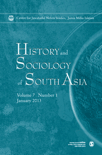
History and Sociology of South Asia
Decoding South Asia: A Journey through Time and SocietyHistory and Sociology of South Asia, published by SAGE Publications Inc, is a critical academic journal dedicated to exploring the intricate tapestry of historical and sociological dynamics within the South Asian context. Established in 2011, this journal provides an essential platform for scholars and researchers to disseminate their findings and engage in discourse about the region's cultural, social, and political complexities. Although it currently ranks in the fourth quartile for Cultural Studies and Sociology & Political Science, and third quartile for History, the journal offers invaluable insights that contribute to the ongoing evaluation of South Asian societal structures and historical narratives. With an HIndex currently not specified, the journal's future aims to elevate its academic influence through rigorous peer-reviewed publications. As researchers, professionals, and students delve into its pages, they will find a wealth of interdisciplinary perspectives crucial for understanding South Asia’s past and present in an increasingly globalized world.
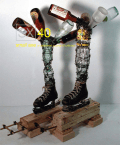
Small Axe
Engaging with Essential Issues in Cultural DiscourseSmall Axe is a distinguished academic journal published by DUKE UNIVERSITY PRESS, focusing on the intersections of Cultural Studies, Literature and Literary Theory, and Sociology and Political Science. With an ISSN of 0799-0537 and an E-ISSN of 1534-6714, this journal has garnered significant recognition in its field, achieving a Q1 ranking in Literature and Literary Theory and a Q2 in Cultural Studies as of 2023. Its commitment to fostering scholarly dialogue on critical issues stretches through converged years from 2018 to 2024, ensuring timely and relevant contributions to the discourse. Although not an Open Access journal, it provides valuable insights and research that are pivotal for academia, driving forward conversations on social justice, identity politics, and the dynamic nature of culture. With strong Scopus ranks that affirm its impact—placing it in the 89th percentile for Literature and Literary Theory and the 65th percentile for Cultural Studies—Small Axe is instrumental for researchers, professionals, and students who are invested in the nuanced exploration of contemporary societal issues.
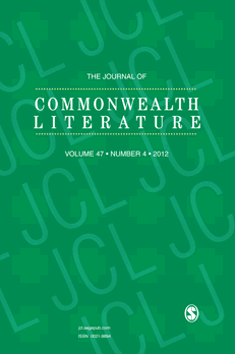
JOURNAL OF COMMONWEALTH LITERATURE
Illuminating the Depths of Commonwealth Literary StudiesJOURNAL OF COMMONWEALTH LITERATURE, published by SAGE Publications Ltd, serves as a premier platform for scholarly discourse in the field of Literature and Literary Theory. Established in 1966, this esteemed journal has built a robust reputation, as evidenced by its impressive Q1 ranking in the 2023 category of Literature and Literary Theory and its placement in the impressive 91st percentile among its peers in the Scopus rankings. With an ISSN of 0021-9894 and an E-ISSN of 1741-6442, the journal provides valuable insights into the rich tapestry of Commonwealth literature, exploring diverse works and critical theories that shape our understanding of literature outside the conventional Western canon. While currently not designated as an Open Access journal, it continues to attract a global readership seeking to advance knowledge in this vital area of scholarship. Researchers, professionals, and students alike will find in its pages a rich resource for innovative ideas and critical discussions that reflect the evolving landscape of literary studies.
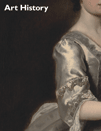
ART HISTORY
Illuminating Artistic Practices Through Rigorous ResearchART HISTORY is a prestigious journal published by Wiley, focusing on the dynamic and diverse field of visual arts and performing arts since its inception in 1978. With an ISSN of 0141-6790 and an E-ISSN of 1467-8365, the journal has established itself as a significant resource for researchers, professionals, and students interested in exploring the complexities of art across various epochs and cultures. Currently ranked in the Q3 category within the Visual Arts and Performing Arts sector and positioned at #132 out of 667 in Scopus rankings—representing the top 80th percentile—ART HISTORY delivers insightful scholarship that contributes to the understanding and appreciation of art history. Although it does not offer open access, the journal remains committed to publishing high-quality, peer-reviewed articles that delve into critical artistic practices, theories, and aesthetics. The journal's location in the United Kingdom further enhances its international reach and influence, making it a vital platform for advancing discourse in the arts.
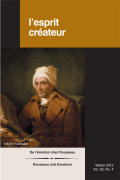
ESPRIT CREATEUR
Fostering Scholarly Excellence in LiteratureESPRIT CREATEUR is a prestigious journal published by the Johns Hopkins University Press, renowned for its contributions to the fields of Literature and Literary Theory. Since its inception in 2002, the journal has become a vital platform for innovative scholarly discourse, achieving an impressive Q2 classification in the 2023 category rankings and a respectable rank of #546 out of 1106 in the Scopus Arts and Humanities - Literature and Literary Theory sector, situating it within the 50th percentile of the discipline. The journal's blend of critical perspectives offers readers insights into contemporary literary analysis and theory, making it essential for researchers, professionals, and students alike. Though it currently adheres to traditional access models, its commitment to fostering high-quality, peer-reviewed scholarship cements its status as a leading voice in literary studies, enhancing its role in academic research and education.

International Journal for History, Culture and Modernity
Illuminating the Path from History to ModernityThe International Journal for History, Culture and Modernity, published by BRILL, stands as a pivotal platform for scholars and practitioners in the fields of history and cultural studies. With an ISSN of 2666-6529 and an E-ISSN of 2213-0624, this journal has been contributing to academic discourse since its inception in 2015. Focusing on contemporary historical analysis, cultural narratives, and modernity, it aims to unravel the intricacies of past and present, thereby fostering a nuanced understanding of societal evolution. Indexed in Scopus with notable rankings—Q2 in History and Q3 in Arts and Humanities (miscellaneous)—it appeals profoundly to researchers and students alike. The journal's commitment to open access ensures that its scholarly contributions remain widely available, making it an essential resource for those dedicated to advancing knowledge in the humanities. Situated in Leiden, Netherlands, at PLANTIJNSTRAAT 2, P O BOX 9000, it embodies a tradition of academic excellence that is integral for contemporary scholarship.
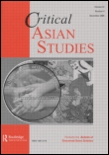
CRITICAL ASIAN STUDIES
Navigating the Intersections of Society and Culture in AsiaCRITICAL ASIAN STUDIES is a leading academic journal published by Routledge Journals, Taylor & Francis Ltd, dedicated to exploring the complex social, cultural, and political dynamics of Asia. With an ISSN of 1467-2715 and an E-ISSN of 1472-6033, this journal serves as an essential resource for researchers and professionals interested in Asian studies, sociology, and geography. Boasting an impressive Q2 ranking in both Geography, Planning and Development, and Sociology and Political Science for 2023, it is recognized for its influential contributions to these fields. The journal’s accessibility options further enhance its appeal, allowing broader dissemination of critical research findings. Established in 1968 and continuing its rigorous publication through to 2024, CRITICAL ASIAN STUDIES facilitates in-depth dialogue and scholarship, thus playing a vital role in advancing understanding of Asian issues on a global scale.
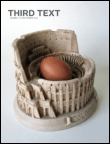
Third Text
Illuminating contemporary discourse in cultural studies.Third Text is a premier academic journal dedicated to the critical engagement with cultural and artistic practices, serving as a vital platform for scholars and practitioners in the fields of Cultural Studies and Visual Arts and Performing Arts. Published by Routledge Journals, Taylor & Francis Ltd in the United Kingdom, this journal has steadily established itself as a leader in its field since its inception in 1987. With an impressive Q2 ranking in both categories as of 2023, Third Text is noted for its rigorous peer-reviewed research and thought-provoking analysis, contributing significantly to contemporary discourse in the arts. While the journal maintains a traditional publication model, it offers a rich array of scholarly articles aimed at fostering dialogue and innovation among researchers, professionals, and students alike. Researchers looking to explore intricate cultural dynamics and the intersections of art, society, and politics will find Third Text an indispensable resource in their academic journey.
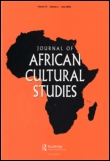
Journal of African Cultural Studies
Connecting Global Perspectives with African HeritageJournal of African Cultural Studies is a premier academic journal published by Routledge Journals, Taylor & Francis Ltd, dedicated to advancing research in the diverse fields of cultural studies, linguistics, literature, music, and the visual and performing arts within the African context. Recognized with a prestigious Q1 ranking across multiple disciplines, including Cultural Studies and Literature, it ranks highly in its category, illustrated by its significant positions in Scopus rankings, showcasing its relevance and influence in shaping discourse. The journal aims to provide a platform for scholarly contributions that explore the rich tapestry of African cultures and their global impacts, engaging researchers, professionals, and students alike in vibrant dialogues. With a commitment to quality and innovation, the Journal of African Cultural Studies serves as an essential resource for anyone seeking to deepen their understanding of African cultural expressions and their significance in the contemporary world.
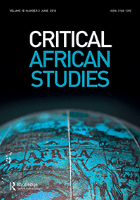
Critical African Studies
Innovating Research in African StudiesCritical African Studies, published by TAYLOR & FRANCIS LTD, is a premier journal dedicated to advancing the discourse on critical issues affecting Africa and its diaspora. With an ISSN of 2168-1392 and an E-ISSN of 2040-7211, this journal has established itself as a leading publication in the field of Arts and Humanities, ranked Q1 in Arts and Humanities (miscellaneous) and Q2 in Social Sciences (miscellaneous) as of 2023, showcasing its commitment to high-quality research. Over its converged years from 2015 to 2024, it has become a critical platform for scholars and practitioners to explore diverse perspectives, innovative ideas, and multidisciplinary approaches to issues such as social justice, governance, and cultural narratives within the African context. The journal's Scopus rankings reflect its significant impact, with impressive placements in both the Arts and Humanities and Social Sciences categories. Critical African Studies aims to foster a robust dialogue among researchers, professionals, and students, making it essential reading for anyone interested in the complexities of Africa's socio-political landscape and cultural heritage.